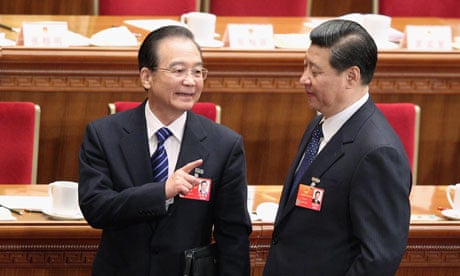The 80 million-strong Communist party of China is famously contradictory – impressively unified in its ability to maintain power, but riven with internal divisions about issues like the role of the market in China, or the function of non-state companies. A botched leadership change this autumn would cause the sort of vicious infighting that led to the collapse of other one-party systems elsewhere.
For this reason, the current Chinese leadership, led by Hu Jintao and Wen Jiabao have been planning this tricky succession for many years. All looked smooth at the end of last year, but as the all-important party congress nears, the process looks increasingly shaky. The fall of key contender Bo Xilai after his wife was accused of murder and he of corruption in the spring was the start of it. The fact that Xi Jinping, heir apparent to Hu, disappeared from view for two weeks in September further raised the temperature. In a political system as opaque and controlling as the current Chinese one, speculation becomes the sole recourse for a population – inside and outside China – which has never been hungrier for information.
The Hu-Wen period leaves one major legacy to successors: immense growth. China's economy is now four times the size it was in 2002 when they came to power, rising from sixth to second place in global rankings, with the greatest amount of foreign reserves, and the largest levels of exports and second largest imports.
Growth has created a number of problems however – greater inequality, environmental and energy supply problems, and a rise in visible tension in society as elites and other interest groups clash, using newly available social media or other legal means to press their case. The eruption of anger over pensions, lack of property rights, and legal redress over official malfeasance is expensive to keep under control. China now spends more on internal security than on national defence. The headache for the new leaders will be how to balance the continuing need for growth against other sociopolitical reforms that will be politically risky, but are the only way to try to create stability and balance in a society which is becoming wealthier, freer and more unruly.
The life of elite leaders is not made any easier by the fact that China is now in an era when the tension between the officials and those they are meant to be ruling has reached fever pitch. Surveys show that central leaders just about maintain some moral credibility in society – but local leaders are regarded with large amounts of loathing. Levels of cynicism about politics in China are on a par with, or even in excess, of those in the west. Most regarded the treatment of Bo Xilai as crude political theatre, created to manoeuvre a clever communicator and a potentially threatening popular leader out of the way. The only given in the current situation is that levels of suspicion against official discourse is high, and the default of most people is disbelief. This is not a good context in which to try to undertake radical reforms.
The new leaders have their hands tied because their macroeconomic policy is already set out in the five-year programme from 2011 to 2015. Only catastrophe would make them change this important statement of consensus. They will also be curtailed by questions about the legitimacy of how they were appointed – this is a process which has never been tried before in this way in China, and many could question it, inside and outside the party – and by the need to keep on board "retired" leaders who are likely to remain active behind the scenes. Their political capital will be low at the start, and it will be a hard slog trying to find easy ways to acquire it quickly.
The post Hu and Wen leadership will have, in addition to the ally of growth, one other great helper. There is, at the moment, no alternative to the party – all effective opposition has been crushed. The party is able to present itself, under whatever leadership, as the great stabilising force, and it can wave horrifying visions of the debilitating effects of instability and disunity before a population that, for the most part, shows strong interest in getting richer and little in pushing for risky political change.
So far, this social contract seems to be holding up. The party rules, and the people get more prosperous. But the question of how long that can continue – of what happens if the growth rate falls, or the wealth gap continues to increase – is a real and pressing one.
For Hu and Wen, China had to grow rich and strong. For the next generation, Chinese society must grow more balanced, more just and more predictable. Achieving that will be a hard task, especially if it also involves maintaining the Communist party's utterly unique place in society.

